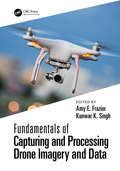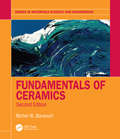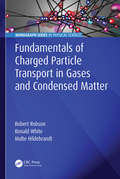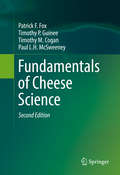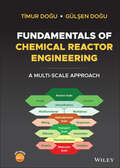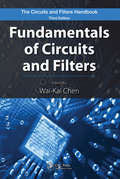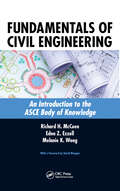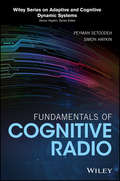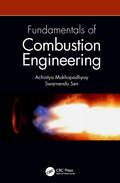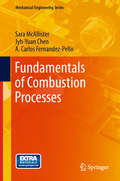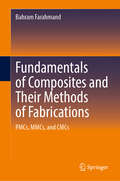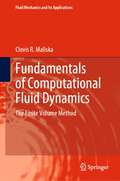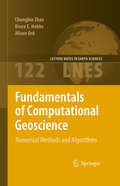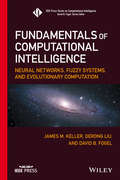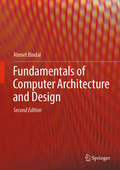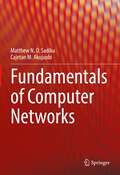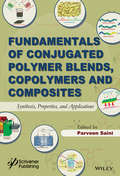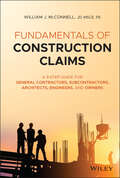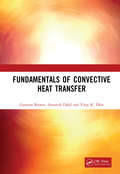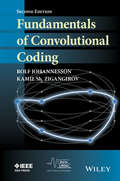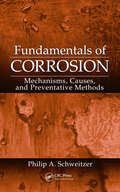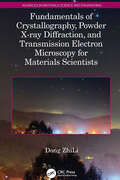- Table View
- List View
Fundamentals of Building Performance Simulation
by Ian Beausoleil-MorrisonFundamentals of Building Performance Simulation, Second Edition pares the theory and practice of a multi-disciplinary field to the essentials for classroom learning and real-world applications. Authored by a veteran educator and researcher, this textbook equips students and emerging and established professionals in engineering and architecture to predict and optimize building energy use. It employs an innovative pedagogical approach, introducing new concepts and skills through previously mastered ones and deepening understanding of familiar themes by means of new material.Covering topics from indoor airflow to the effects of the weather to HVAC systems, the book’s 25 chapters empower learners to: Understand the models and assumptions underlying BPS tools Compare models, simulations, and modelling tools and make appropriate selections Recognize the effects of modelling choices and input data on simulation predictions Each subject is introduced without reference to particular simulation tools, while practice problems at the end of each chapter provide hands-on experience with the tools of the reader’s choice. Curated reading lists orient beginners in a vast, cross-disciplinary literature, and the critical thinking skills stressed throughout prepare them to make contributions of their own. Fundamentals of Building Performance Simulation, Second Edition provides a much-needed resource for new and aspiring members of the building science community.The textbook will be accompanied by student and instructor digital resources including chapter introduction videos by the author, software and simulation walkthrough videos, weather data, photographs, drawings and measured data to support the culminating trials.
Fundamentals of Capturing and Processing Drone Imagery and Data
by Amy E. Frazier Kunwar K. SinghUnmanned aircraft systems (UAS) are rapidly emerging as flexible platforms for capturing imagery and other data across the sciences. Many colleges and universities are developing courses on UAS-based data acquisition. Fundamentals of Capturing and Processing Drone Imagery and Data is a comprehensive, introductory text on how to use unmanned aircraft systems for data capture and analysis. It provides best practices for planning data capture missions and hands-on learning modules geared toward UAS data collection, processing, and applications. FEATURES Lays out a step-by-step approach to identify relevant tools and methods for UAS data/image acquisition and processing. Provides practical hands-on knowledge with visual interpretation, well-organized and designed for a typical 16-week UAS course offered on college and university campuses. Suitable for all levels of readers and does not require prior knowledge of UAS, remote sensing, digital image processing, or geospatial analytics. Includes real-world environmental applications along with data interpretations and software used; exercises in chapters 8 through 19 have support materials for free download. Combines the expertise of a wide range of UAS researchers and practitioners across the geospatial sciences. This book provides a general introduction to drones along with a series of hands-on exercises that students and researchers can engage with to learn to integrate drone data into real-world applications. No prior background in remote sensing, GIS, or drone knowledge is needed to use this book. Readers will learn to process different types of UAS imagery for applications (such as precision agriculture, forestry, urban landscapes) and apply this knowledge in environmental monitoring and land-use studies.
Fundamentals of Ceramics (Series in Materials Science and Engineering)
by Michel BarsoumFundamentals of Ceramics presents readers with an exceptionally clear and comprehensive introduction to ceramic science. This Second Edition updates problems and adds more worked examples, as well as adding new chapter sections on Computational Materials Science and Case Studies. The Computational Materials Science sections describe how today density functional theory and molecular dynamics calculations can shed valuable light on properties, especially ones that are not easy to measure or visualize otherwise such as surface energies, elastic constants, point defect energies, phonon modes, etc. The Case Studies sections focus more on applications, such as solid oxide fuel cells, optical fibers, alumina forming materials, ultra-strong and thin glasses, glass-ceramics, strong and tough ceramics, fiber-reinforced ceramic matrix composites, thermal barrier coatings, the space shuttle tiles, electrochemical impedance spectroscopy, two-dimensional solids, field-assisted and microwave sintering, colossal magnetoresistance, among others.
Fundamentals of Chaos and Fractals for Cardiology
by Gary DrzewieckiThis textbook serves as an introduction to nonlinear dynamics and fractals for physiological modeling. Examples and demonstrations from current research in cardiopulmonary engineering and neuro-systems engineering are provided, as well as lab and computer exercises that encourage readers to apply the course material. This is an ideal textbook for graduate students in biomedical engineering departments, researchers who analyze physiological data, and researchers interested in physiological modeling.
Fundamentals of Charged Particle Transport in Gases and Condensed Matter (Monograph Series in Physical Sciences)
by Ronald White Robert Robson Malte HildebrandtThis book offers a comprehensive and cohesive overview of transport processes associated with all kinds of charged particles, including electrons, ions, positrons, and muons, in both gases and condensed matter. The emphasis is on fundamental physics, linking experiment, theory and applications. In particular, the authors discuss: The kinetic theory of gases, from the traditional Boltzmann equation to modern generalizations A complementary approach: Maxwell’s equations of change and fluid modeling Calculation of ion-atom scattering cross sections Extension to soft condensed matter, amorphous materials Applications: drift tube experiments, including the Franck-Hertz experiment, modeling plasma processing devices, muon catalysed fusion, positron emission tomography, gaseous radiation detectors Straightforward, physically-based arguments are used wherever possible to complement mathematical rigor. Robert Robson has held professorial positions in Japan, the USA and Australia, and was an Alexander von Humboldt Fellow at several universities in Germany. He is a Fellow of the American Physical Society. Ronald White is Professor of Physics and Head of Physical Sciences at James Cook University, Australia. Malte Hildebrandt is Head of the Detector Group in the Laboratory of Particle Physics at the Paul Scherrer Institut, Switzerland.
Fundamentals of Cheese Science
by Patrick F. Fox Paul L. H. Mcsweeney Timothy P. Guinee Timothy M. CoganThis book provides comprehensive coverage of the scientific aspects of cheese, emphasizing fundamental principles. The book's updated 22 chapters cover the chemistry and microbiology of milk for cheesemaking, starter cultures, coagulation of milk by enzymes or by acidification, the microbiology and biochemistry of cheese ripening, the flavor and rheology of cheese, processed cheese, cheese as a food ingredient, public health and nutritional aspects of cheese, and various methods used for the analysis of cheese. The book contains copious references to other texts and review articles.
Fundamentals of Chemical Reaction Engineering (Dover Civil and Mechanical Engineering)
by Robert J. Davis Mark E. DavisAppropriate for a one-semester undergraduate or first-year graduate course, this text introduces the quantitative treatment of chemical reaction engineering. It covers both homogeneous and heterogeneous reacting systems and examines chemical reaction engineering as well as chemical reactor engineering. Each chapter contains numerous worked-out problems and real-world vignettes involving commercial applications, a feature widely praised by reviewers and teachers. 2003 edition.
Fundamentals of Chemical Reactor Engineering: A Multi-Scale Approach
by Timur Dogu Gulsen DoguFUNDAMENTALS OF CHEMICAL REACTOR ENGINEERING A comprehensive introduction to chemical reactor engineering from an industrial perspective In Fundamentals of Chemical Reactor Engineering: A Multi-Scale Approach, a distinguished team of academics delivers a thorough introduction to foundational concepts in chemical reactor engineering. It offers readers the tools they need to develop a firm grasp of the kinetics and thermodynamics of reactions, hydrodynamics, transport processes, and heat and mass transfer resistances in a chemical reactor. This textbook describes the interaction of reacting molecules on the molecular scale and uses real-world examples to illustrate the principles of chemical reactor analysis and heterogeneous catalysis at every scale. It includes a strong focus on new approaches to process intensification, the modeling of multifunctional reactors, structured reactor types, and the importance of hydrodynamics and transport processes in a chemical reactor. With end-of-chapter problem sets and multiple open-ended case studies to promote critical thinking, this book also offers supplementary online materials and an included instructor’s manual. Readers will also find: A thorough introduction to the rate concept and species conservation equations in reactors, including chemical and flow reactors and the stoichiometric relations between reacting species A comprehensive exploration of reversible reactions and chemical equilibrium, including the thermodynamics of chemical reactions and different forms of the equilibrium constant Practical discussions of chemical kinetics and analysis of batch reactors, including batch reactor data analysis In-depth examinations of ideal flow reactors, CSTR, and plug flow reactor models Ideal for undergraduate and graduate chemical engineering students studying chemical reactor engineering, chemical engineering kinetics, heterogeneous catalysis, and reactor design, Fundamentals of Chemical Reactor Engineering is also an indispensable resource for professionals and students in food, environmental, and materials engineering.
Fundamentals of Circuits and Filters (The Circuits and Filters Handbook, 3rd Edition)
by Wai-Kai ChenThis volume, drawn from the Circuits and Filters Handbook, focuses on mathematics basics; circuit elements, devices, and their models; and linear circuit analysis. It examines Laplace transformation, Fourier methods for signal analysis and processing, z-transform, and wavelet transforms. It also explores network laws and theorems, terminal and port represetnation, analysis in the frequency domain, and more.
Fundamentals of Civil Engineering: An Introduction to the ASCE Body of Knowledge
by Richard H. McCuenWhile the ASCE Body of Knowledge (BOK2) is the codified source for all technical and non-technical information necessary for those seeking to attain licensure in civil engineering, recent graduates have notoriously been lacking in the non-technical aspects even as they excel in the technical.Fundamentals of Civil Engineering: An Introduction to the
Fundamentals of Cognitive Radio
by Simon Haykin Peyman SetoodehA comprehensive treatment of cognitive radio networks and the specialized techniques used to improve wireless communications The human brain, as exemplified by cognitive radar, cognitive radio, and cognitive computing, inspires the field of Cognitive Dynamic Systems. In particular, cognitive radio is growing at an exponential rate. Fundamentals of Cognitive Radio details different aspects of the human brain and provides examples of how it can be mimicked by cognitive dynamic systems. The text offers a communication-theoretic background, including information on resource allocation in wireless networks and the concept of robustness. The authors provide a thorough mathematical background with data on game theory, variational inequalities, and projected dynamic systems. They then delve more deeply into resource allocation in cognitive radio networks. The text investigates the dynamics of cognitive radio networks from the perspectives of information theory, optimization, and control theory. It also provides a vision for the new world of wireless communications by integration of cellular and cognitive radio networks. This groundbreaking book: Shows how wireless communication systems increasingly use cognition to enhance their networks Explores how cognitive radio networks can be viewed as spectrum supply chain networks Derives analytic models for two complementary regimes for spectrum sharing (open-access and market-driven) to study both equilibrium and disequilibrium behaviors of networks Studies cognitive heterogeneous networks with emphasis on economic provisioning for resource sharing Introduces a framework that addresses the issue of spectrum sharing across licensed and unlicensed bands aimed for Pareto optimality Written for students of cognition, communication engineers, telecommunications professionals, and others, Fundamentals of Cognitive Radio offers a new generation of ideas and provides a fresh way of thinking about cognitive techniques in order to improve radio networks.
Fundamentals of Combustion Engineering
by Achintya Mukhopadhyay Swarnendu SenThis book is an introductory text on fundamental aspects of combustion including thermodynamics, heat and mass transfer and chemical kinetics which are used to systematically derive the basic concepts of combustion. Apart from the fundamental aspects, many of the emerging topics in the field like microscale combustion, combustion dynamics, oxy-fuel combustion and combustion diagnostics are also covered in the book. This would help the beginners in the subject to get initiated to the state of the art topics. Key Features: Coverage of the essential aspects of combustion engineering suitable for both beginners and practicing professionals Topics like entropy generation, microscale combustion, combustion diagnostics, second law-based analysis exclusive to the title Balanced treatment of thermodynamics, transport phenomena and chemical kinetics Discussion on state of the art techniques in combustion diagnostics Illustrates combustion of gaseous, liquid and solid fuels along with emission of pollutants and greenhouse gases
Fundamentals of Combustion Processes
by Jyh-Yuan Chen A. Carlos Fernandez-Pello Sara McallisterFundamentals of Combustion Processes is designed as a textbook for an upper-division undergraduate and graduate level combustion course in mechanical engineering. The authors focus on the fundamental theory of combustion and provide a simplified discussion of basic combustion parameters and processes such as thermodynamics, chemical kinetics, ignition, diffusion and pre-mixed flames. The text includes exploration of applications, example exercises, suggested homework problems and videos of laboratory demonstrations
Fundamentals of Composites and Their Methods of Fabrications: PMCs, MMCs, and CMCs
by Bahram FarahmandThis book provides readers with essential insights into composite materials, encompassing methods for fabricating composite parts (PMCs, MMCs, CMCs), determining their mechanical properties via coupon testing and rule of mixtures, and exploring their industrial applications. Additionally, the book covers topics of interest for engineers, including damage tolerance analysis, nondestructive inspections, repairing damaged composite and metallic parts, and fabricating composite parts using additive manufacturing processes. Drawing on his years of experience in the aerospace industry, the author believes the topics presented will be valuable to readers and that engineers in industries, students in academia, and university instructors will find this book beneficial. Introduces progressive failure analysis, fatigue, and fracture of composite, molecular dynamics, virtual testing, with several practical example problems Explores additive manufacturing methods and their application in fabricating PMCs and assessing mechanical properties Introduces nanocomposites and their fabrication methods, detailing advantages and disadvantages of the parts produced
Fundamentals of Computational Fluid Dynamics: The Finite Volume Method (Fluid Mechanics and Its Applications #135)
by Clovis R. MaliskaThis book presents the developments of the finite volume method applied to fluid flows, starting from the foundations of the method and reaching the latest approaches using unstructured grids. It helps students learn progressively, creating a strong background on CFD. The text is divided into two parts. The first one is about the basic concepts of the finite volume method, while the second one presents the formulation of the finite volume method for any kind of domain discretization. In the first part of the text, for the sake of simplicity, the developments are done using the Cartesian coordinate system, without prejudice to the complete understanding. The second part extends this knowledge to curvilinear and unstructured grids. As such, the book contains material for introductory courses on CFD for under and graduate students, as well as for more advanced students and researchers.
Fundamentals of Computational Geoscience
by Bruce E. Hobbs Alison Ord Chongbin ZhaoThis monograph aims to provide state-of-the-art numerical methods, procedures and algorithms in the field of computational geoscience, based on the authors' own work during the last decade. Although some theoretical results are provided to verify numerical ones, the main focus of this monograph is on computational simulation aspects of the newly-developed computational geoscience discipline. The advanced numerical methods, procedures and algorithms presented are also applicable to a wide range of problems in both geological length-scales and engineering length-scales. In order to broaden the readership, common mathematical notations are used to describe the theoretical aspects of geoscience problems, making it either an invaluable textbook for postgraduate students or an indispensable reference book for computational geoscientists, mathematicians, engineers and geoscientists.
Fundamentals of Computational Intelligence: Neural Networks, Fuzzy Systems, and Evolutionary Computation
by Derong Liu James M. Keller David B. FogelProvides an in-depth and even treatment of the three pillars of computational intelligence and how they relate to one another This book covers the three fundamental topics that form the basis of computational intelligence: neural networks, fuzzy systems, and evolutionary computation. The text focuses on inspiration, design, theory, and practical aspects of implementing procedures to solve real-world problems. While other books in the three fields that comprise computational intelligence are written by specialists in one discipline, this book is co-written by current former Editor-in-Chief of IEEE Transactions on Neural Networks and Learning Systems, a former Editor-in-Chief of IEEE Transactions on Fuzzy Systems, and the founding Editor-in-Chief of IEEE Transactions on Evolutionary Computation. The coverage across the three topics is both uniform and consistent in style and notation. Discusses single-layer and multilayer neural networks, radial-basis function networks, and recurrent neural networks Covers fuzzy set theory, fuzzy relations, fuzzy logic interference, fuzzy clustering and classification, fuzzy measures and fuzzy integrals Examines evolutionary optimization, evolutionary learning and problem solving, and collective intelligence Includes end-of-chapter practice problems that will help readers apply methods and techniques to real-world problems Fundamentals of Computational intelligence is written for advanced undergraduates, graduate students, and practitioners in electrical and computer engineering, computer science, and other engineering disciplines.
Fundamentals of Computer Architecture and Design
by Ahmet BindalThis textbook provides semester-length coverage of computer architecture and design, providing a strong foundation for students to understand modern computer system architecture and to apply these insights and principles to future computer designs. It is based on the author’s decades of industrial experience with computer architecture and design, as well as with teaching students focused on pursuing careers in computer engineering. Unlike a number of existing textbooks for this course, this one focuses not only on CPU architecture, but also covers in great detail in system buses, peripherals and memories. This book teaches every element in a computing system in two steps. First, it introduces the functionality of each topic (and subtopics) and then goes into “from-scratch design” of a particular digital block from its architectural specifications using timing diagrams. The author describes how the data-path of a certain digital block is generated using timing diagrams, a method which most textbooks do not cover, but is valuable in actual practice. In the end, the user is ready to use both the design methodology and the basic computing building blocks presented in the book to be able to produce industrial-strength designs.
Fundamentals of Computer Networks
by Cajetan M. Akujuobi Matthew N. SadikuThis textbook presents computer networks to electrical and computer engineering students in a manner that is clearer, more interesting, and easier to understand than other texts. All principles are presented in a lucid, logical, step-by-step manner. As much as possible, the authors avoid wordiness and giving too much detail that could hide concepts and impede overall understanding of the material. Ten review questions in the form of multiple-choice objective items are provided at the end of each chapter with answers. The review questions are intended to cover the little “tricks” which the examples and end-of-chapter problems may not cover. They serve as a self-test device and help students determine how well they have mastered the chapter.
Fundamentals of Conjugated Polymer Blends, Copolymers and Composites
by Parveen SainiSince their discovery in 1977, the evolution of conducting polymers has revolutionized modern science and technology. These polymers enjoy a special status in the area of materials science yet they are not as popular among young readers or common people when compared to other materials like metals, paper, plastics, rubber, textiles, ceramics and composites like concrete. Most importantly, much of the available literature in the form of papers, specific review articles and books is targeted either at advanced readers (scientists/technologists/engineers/senior academicians) or for those who are already familiar with the topic (doctoral/postdoctoral scholars). For a beginner or even school/college students, such compilations are bit difficult to access/digest. In fact, they need proper introduction to the topic of conducting polymers including their discovery, preparation, properties, applications and societal impact, using suitable examples and already known principles/knowledge/phenomenon. Further, active participation of readers in terms of "question & answers", "fill-in-the-blanks", "numerical" along with suitable answer key is necessary to maintain the interest and to initiate the "thought process". The readers also need to know about the drawbacks and any hazards of such materials. Therefore, I believe that a comprehensive source on the science/technology of conducting polymers which maintains a link between grass root fundamentals and state-of-the-art R&D is still missing from the open literature.
Fundamentals of Construction Claims: A 9-Step Guide for General Contractors, Subcontractors, Architects, Engineers, and Owners
by William J. McConnellDemystify complicated construction claims with this indispensable guide Given how common complex claims have become in the modern built environment, Fundamentals of Construction Claims: A 10-Step Guide for General Contractors, Subcontractors, Architects and Engineers is an absolutely critical addition to the library of any construction professional. Written by William J. McConnell, PE, JD, MSCE, CDT, a celebrated, lawyer, author, engineer, and expert witness, Fundamentals of Construction Claims sets out clear and concrete strategies for developing a construction claim from beginning to end. The author's straightforward 10-Step method helps readers avoid costly dispute resolution fees by: Explaining entitlement requirements for various types of claims, including differing site conditions, added scope, and weather delays Offering procedures for calculating delay impacts through forensic scheduling analysis Defining, in detail, four simple ways to prove damages Throughout, relevant case studies are used to illuminate the principles found within and bring life to the concepts the author introduces.
Fundamentals of Convective Heat Transfer
by Gautam Biswas Amaresh Dalal Vijay DhirThermal convection is often encountered by scientists and engineers while designing or analyzing flows involving exchange of energy. Fundamentals of Convective Heat Transfer is a unified text that captures the physical insight into convective heat transfer and thorough, analytical, and numerical treatments. It also focuses on the latest developments in the theory of convective energy and mass transport. Aimed at graduates, senior undergraduates, and engineers involved in research and development activities, the book provides new material on boiling, including nuances of physical processes. In all the derivations, step-by-step and systematic approaches have been followed.
Fundamentals of Convolutional Coding
by Rolf Johannesson Kamil Sh. ZigangirovFundamentals of Convolutional Coding, Second Edition, regarded as a bible of convolutional coding brings you a clear and comprehensive discussion of the basic principles of this field Two new chapters on low-density parity-check (LDPC) convolutional codes and iterative coding Viterbi, BCJR, BEAST, list, and sequential decoding of convolutional codes Distance properties of convolutional codes Includes a downloadable solutions manual
Fundamentals of Corrosion: Mechanisms, Causes, and Preventative Methods (Corrosion Technology)
by P.E., Philip SchweitzerWritten by an authority in corrosion science, this reference offers a comprehensive description of the causes of corrosion as well as the means to limit or prevent it. It explains the mechanisms and forms of corrosion, the methods of attack on plastic materials, and the causes of failure in protective coatings, linings, and paints. Emphasizing atmospheric exposure, the text presents vital information regarding the design of structures, automobiles, household plumbing, manufacturing equipment, and other entities, as well as the effects of de-icing chemicals on highways and bridges.
Fundamentals of Crystallography, Powder X-ray Diffraction, and Transmission Electron Microscopy for Materials Scientists (Advances in Materials Science and Engineering)
by Dong ZhiLiThe structure–property relationship is a key topic in materials science and engineering. To understand why a material displays certain behaviors, the first step is to resolve its crystal structure and reveal its structure characteristics. Fundamentals of Crystallography, Powder X-ray Diffraction, and Transmission Electron Microscopy for Materials Scientists equips readers with an in-depth understanding of using powder x-ray diffraction and transmission electron microscopy for the analysis of crystal structures. Introduces fundamentals of crystallography Covers XRD of materials, including geometry and intensity of diffracted x-ray beams and experimental methods Describes TEM of materials and includes atomic scattering factors, electron diffraction, and diffraction and phase contrasts Discusses applications of HRTEM in materials research Explains concepts used in XRD and TEM lab training Based on the author’s course lecture notes, this text guides materials science and engineering students with minimal reliance on advanced mathematics. It will also appeal to a broad spectrum of readers, including researchers and professionals working in the disciplines of materials science and engineering, applied physics, and chemical engineering.

